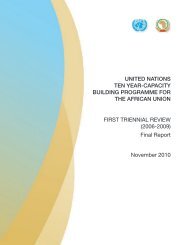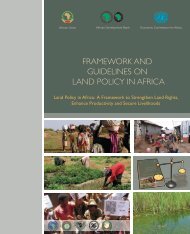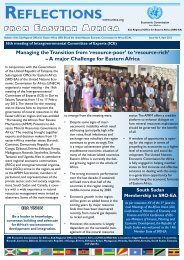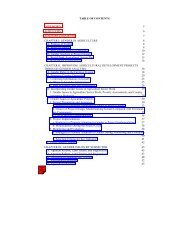A Decade of NEPAD - Economic Commission for Africa - uneca
A Decade of NEPAD - Economic Commission for Africa - uneca
A Decade of NEPAD - Economic Commission for Africa - uneca
You also want an ePaper? Increase the reach of your titles
YUMPU automatically turns print PDFs into web optimized ePapers that Google loves.
Deepening Ownership and<br />
Partnership <strong>of</strong> <strong>NEPAD</strong>:<br />
Key Recommendations<br />
While much has been made <strong>of</strong> the various shortcomings<br />
<strong>of</strong> <strong>NEPAD</strong> in its relatively short life, there are some very<br />
concrete and tangible opportunities emerging <strong>for</strong> engagement/<br />
re-engagement within the <strong>NEPAD</strong> programme <strong>for</strong><br />
<strong>Africa</strong>n private sector institutions and <strong>Africa</strong>n CSOs.<br />
Two evolutionary processes occurred simultaneously which<br />
present unprecedented opportunities <strong>for</strong> increased engagement<br />
with <strong>NEPAD</strong> and renewed opportunity <strong>for</strong> the private<br />
sector and civil society to participate in, and benefit from<br />
<strong>NEPAD</strong>’s programme <strong>of</strong> action: the <strong>NEPAD</strong> integration<br />
and the planned trans<strong>for</strong>mation <strong>of</strong> the <strong>Africa</strong>n Union<br />
<strong>Commission</strong> into the <strong>Africa</strong>n Union Authority<br />
<strong>NEPAD</strong>/ AU Integration Process – The evolution process<br />
that led to the creation <strong>of</strong> a <strong>NEPAD</strong> Planning and Coordination<br />
Agency will create increased CSO engagement<br />
with <strong>NEPAD</strong> as the CSOs actively involved with the AUC<br />
will now find the <strong>NEPAD</strong> Agency within their purview<br />
<strong>for</strong> monitoring as an integrated organ <strong>of</strong> the Union. The<br />
<strong>Africa</strong>n private sector will note that there are increased<br />
business opportunities and support <strong>for</strong> SMEs available<br />
through <strong>NEPAD</strong> given the refinements made in the AU/<br />
<strong>NEPAD</strong> <strong>Africa</strong>n Action Plan and the expanded resources<br />
that have been pledged/ mobilized to support <strong>NEPAD</strong>’s<br />
implementation over the next five years. The <strong>NEPAD</strong><br />
Agency should also find more resources mobilized <strong>for</strong><br />
its support as “<strong>NEPAD</strong>” becomes a prospective beneficiary<br />
<strong>of</strong> resources mobilized in support <strong>of</strong> the UN-AU<br />
Cooperation: Framework <strong>for</strong> the “Ten-year Capacity<br />
Building Programme <strong>for</strong> the <strong>Africa</strong>n Union” which<br />
was launched in 2006. This evolving but comprehensive<br />
framework aims to clarify the areas, <strong>for</strong>ms and scale <strong>of</strong><br />
783<br />
CHAPTER<br />
how the UN system responds to the capacity needs <strong>of</strong><br />
the <strong>Africa</strong>n Union.<br />
AU <strong>Commission</strong> trans<strong>for</strong>mation into the <strong>Africa</strong>n Union<br />
Authority Process – During the 13 th Ordinary Session held<br />
in Sirte, Libya in July 2009, the Assembly <strong>of</strong> Heads <strong>of</strong> State<br />
and Government <strong>of</strong> the <strong>Africa</strong>n Union considered and<br />
endorsed the recommendations <strong>of</strong> the 12 th Extraordinary<br />
Session <strong>of</strong> the Executive Council on the trans<strong>for</strong>mation n<br />
<strong>of</strong> the <strong>Africa</strong>n Union <strong>Commission</strong> into the <strong>Africa</strong>n Union<br />
Authority. The trans<strong>for</strong>mation <strong>of</strong> the <strong>Commission</strong> into<br />
an Authority is intended to strengthen the institutional<br />
framework <strong>of</strong> the Union in order to enable it to play its role<br />
in accelerating the political and socio-economic integration<br />
<strong>of</strong> the Continent towards the achievement <strong>of</strong> the United<br />
States <strong>of</strong> <strong>Africa</strong>. Selected functions <strong>of</strong> the Authority beyond<br />
those already existing under the AU <strong>Commission</strong> include:<br />
ӹ Promotion <strong>of</strong> Pan-<strong>Africa</strong>nism and the protection and<br />
defense, generally, <strong>of</strong> <strong>Africa</strong>n interests within and outside<br />
<strong>of</strong> the continent,<br />
ӹ Mobilization <strong>of</strong> <strong>Africa</strong>n people on the continent and in<br />
the Diaspora to identify with and support the process<br />
<strong>of</strong> renewal and re<strong>for</strong>m <strong>of</strong> the continent as a framework<br />
<strong>for</strong> <strong>Africa</strong>n renaissance;<br />
ӹ Coordinate the implementation <strong>of</strong> the Common <strong>Africa</strong>n<br />
Defense and Security Policy relating to defense as<br />
well as the strategies and mobilization <strong>of</strong> the resources<br />
required <strong>for</strong> the defense <strong>of</strong> the Continent.<br />
With this transition, the AU’s work to mobilize the <strong>Africa</strong>n<br />
Diaspora as the 6 th region and the many relationships with<br />
the Diaspora that have been developing over the past five







